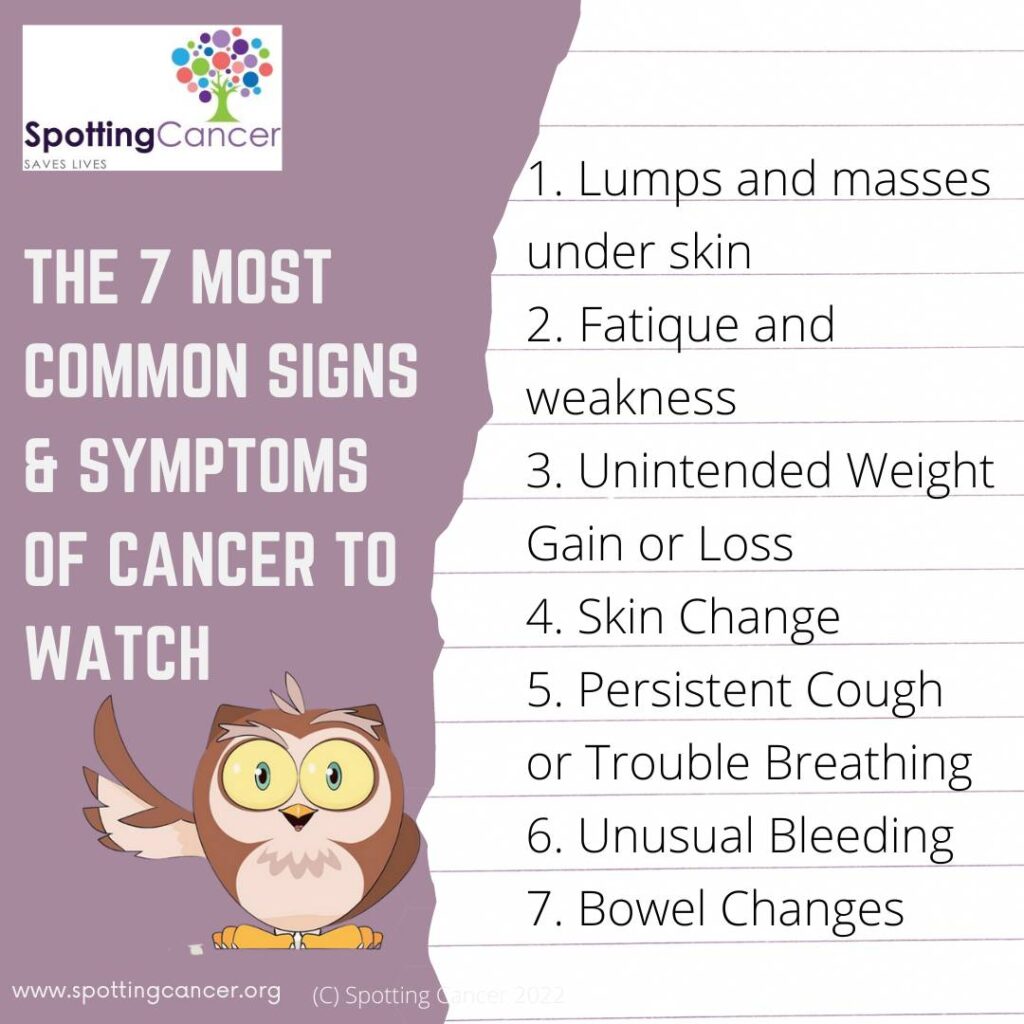- Get a regular medical check up
- Know your family patient history
- Regular screening and testing
- Know at least the seven most common signs of cancer so you can recognize them.
It’s essential to know the common signs and symptoms of cancer. It enables early detection of cancer or other bodily abnormalities between scheduled screenings and appointments thus, enabling you to seek early treatment. Make sure to understand your body to establish what is normal and abnormal in your body.
Here is a broad spectrum of important signs and symptoms common to cancers. However, noticing the symptoms doesn’t mean you have cancer. To be safe, consult your doctor when noticing these signs and symptoms. The seven common signs & symptoms discussed in this blog are only a few of the many signs and symptoms of cancer. Refer to our website for more detailed information.
1. Lumps and Masses Under the Skin
The presence of lumps, tumors, bumps, or masses on your body can be early symptoms of cancer. Detecting or noticing these symptoms increases your chances of survival if you take action.
Here are some symptoms to look out for in your body;
- Lumps underneath the skin that are irregular in shape, not tender to touch,
- Any growth on or in the nipple, groin, armpit, neck, or breast
- Increase in size of an existing swelling or lump
- Enlargement or swelling of a testicle
2. Fatigue and Weakness
Though they often describe similar symptoms, they are entirely different. Fatigue refers to the feeling of persistent lack of energy or tiredness. Weakness is the lack of muscle or physical strength needed to move your body and usually goes away within a few days. Fatigue is a more common sign of cancer. It is a feeling of tiredness that doesn’t seem to go away no matter how much sleep you get.By spotting the symptoms like the ones below early and taking action can save your life;
- Trouble getting sleep
- Constant body exhaustion and need to take a nap
- Body fatigue and lack of energy to perform your daily routine
- Overwhelming tiredness not relating to any activity
- Lack of interest in things you enjoy doing
- Anxiety, sadness, or depression
- Heavy and hard-to-move arms and legs
- Overwhelming tiredness during or after an activity
- Breath shortness when performing simple chores like making a bed
- Painful muscles when climbing stairs or walking for a short distance
3. Unintended Weight Gain or Loss
Any unexplained and sudden increase or loss of body weight typically indicates an abnormality in your body and could be a cancer symptom.- Any unexpected weight loss of more than 10 pounds or 10% of your body weight in the last two months. It should not arise from stress, change in diet, or exercise. Weight loss can be the first indication of cancer.
- Unexpected weight gain accompanied by frequent bloating, tummy pains, acid reflux, and heartburn
4. Skin Change
Any unusual changes in your skin color, size, shape, or pain can signify cancer. During body routine checks, look for any ABCDE changes on your birthmarks, freckles, moles, and body markings.
Here are the signs and symptoms of cancer affecting your skin to watch out for when conducting a routine self-examination;
- A- Asymmetrical: are if the two halves of a mole differ from one another
- B – Border: Check for any rough and uneven edges
- C – Color: Check for multiple colors on a mole or patch
- D – Diameter: check for any changes affecting your skin with a diameter larger than 6 millimeters or a ¼ of an inch
- E – Evolving: Check for new symptoms that include itching, bleeding, or crusting
Other signs and symptoms include
- Small, firm, painless, dome-shaped bumps that are similar to insect bites. They are purple or light pink in color and change in size rapidly.
- Changes in skin color, the skin may turn pale, yellowish, ashy, or darken
- Any large moles that suddenly start bleeding on the blemishes
- Skin changes or sores on the vagina or penis
- Unexpected bright red spots or bruising
- Hardening or thickening of the skin
- Fatty and uneven texture under the skin
- Sudden and excessive hair growth on the skin
5. Persistent Cough or Trouble Breathing
A persistent cough that lingers accompanied by wheezing and breath shortness can indicate lung cancer. Early detection enhances the odds of successful treatment.Consult your doctor if you notice the following signs and symptoms;
- Persistent cough lasting more than three weeks
- Breath shortness after walking a short distance
- Sharp and persistent back, chest, or shoulder pains when coughing
- Chest pains when taking a deep breath
- Shortness of breath or difficulty in breathing
- Sudden loss of breath when resting or performing simple chores
- Chronic respiratory infections
6. Unusual Bleeding
Constant, abnormal, and unexplained bleeding can indicate the presence of cancer in your body. If you notice any unusual bleeding call your medical provider to determine the cause. Early detection of cancer enables one to seek treatment and manage the disease.Here are bleeding signs and symptoms to watch. If you notice any unexplained bleeding, take action. Call your doctor.
- Bleeding nipples
- Vaginal bleeding between periods
- Bleeding during and after intercourse
- Blood clots when coughing
- Post-menopausal bleeding
- Bleeding scabs or moles
- Blood discharge from the penis
- Blood stains in semen after ejaculation
- Blood chips or clots in urine
- Presence of blood stains when spitting or vomiting
- Heavy irregular or extended periods
- Frequent and unexplained nosebleeds
7. Bowel Changes
Suppose you notice any unexplained changes in your bowel movements that last for more than three weeks. Change in bowel movements is a prevalent sign of cancer development.Consult your doctor or undergo cancer screening if you notice the following signs and symptoms in your bowel movements;
- Presence of blood stains in urine or stool
- Unexplained frequent and repeated constipation or diarrhea
- Constant and frequent urge to pass urine or stool
- Difficulty or painful bowel movements
- Any changes in color, shape, or size of the stool
- Urine flow changes
- Smelly or pale stool
- Rectal bleeding
- Loss of bladder control
- Passing stool with a fatty coating
- Passing urine with red chips stains
Conclusion:
The seven signs and symptoms discussed in this blog are just a few of the many you could experience, if you spot one consider it a red flag. (Visit spottingcancer.org if you want to learn more.) However, it does not mean you have cancer. If you notice any changes in your body, consult your doctor for a professional evaluation.

